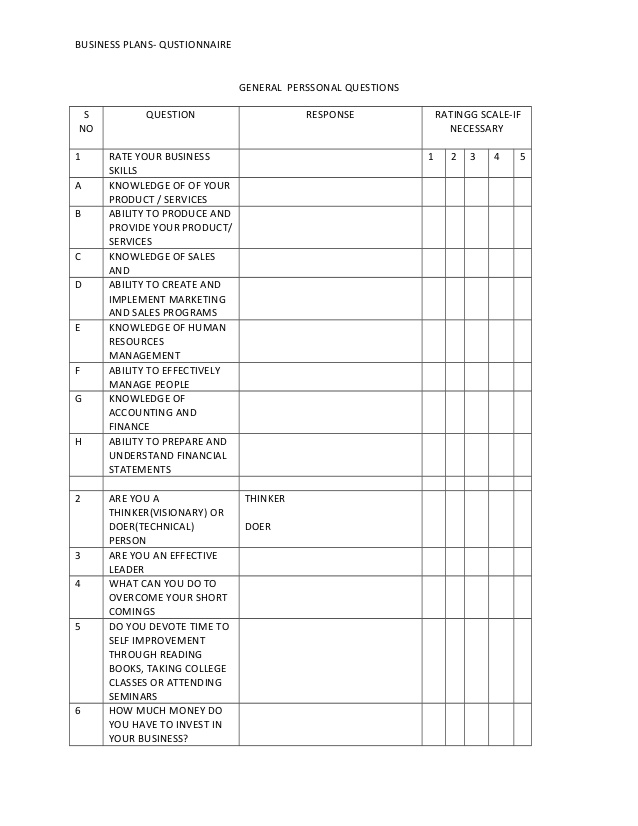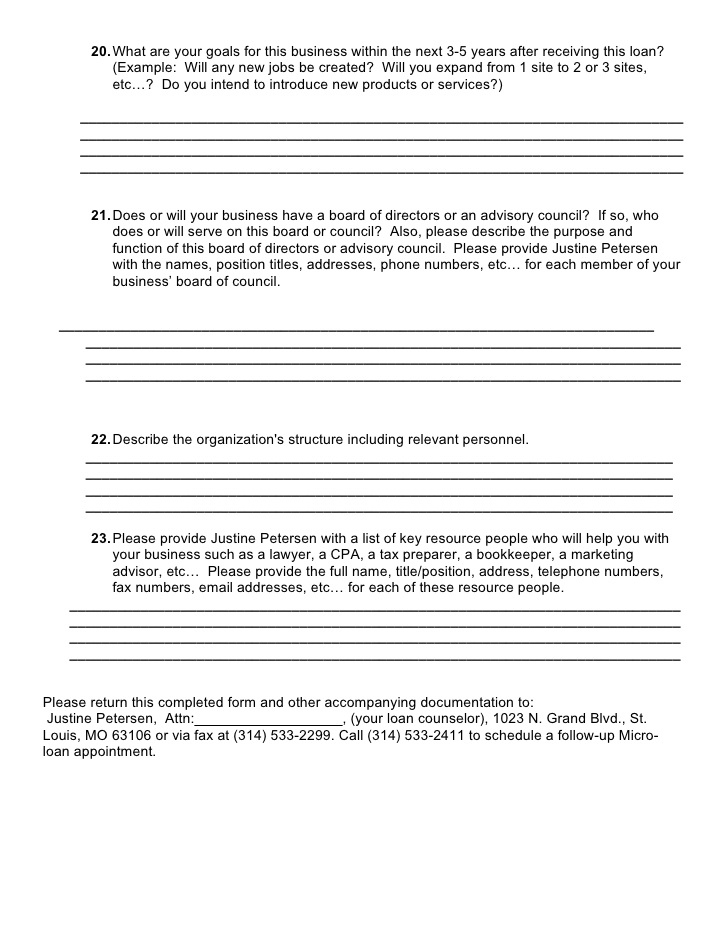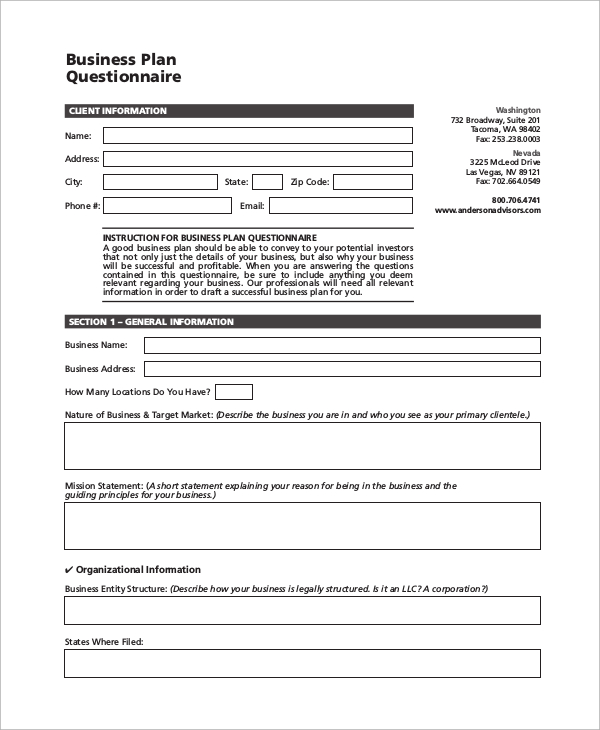Formulating a Business Plan with Questionnaire Examples
Looking to start up your own business? If you happen to be one of those people, then this article is meant for you. Drafting your own business plans means that you have an initial idea on how your business is going to turn out and how it is going to survive in the next couple of years. A good business plan guides you through each stage of starting and managing your business.
Business Plan Questionnaire Example
Business plans can help you get funding or bring on new business partners. Investors want to feel confident they’ll see a return on their investment as it is the tool you’ll use to convince people that working with you — or investing in your company — is a good and smart choice.
Picking the Right Business Plan
There is no right or wrong business plan- there is only the plan that can best suit your needs. Businessmen and investors would normally make use of the traditional business plan as they are more common that make use of a standard structure, and encourage you to go into detail in each section. The disadvantage of this however is that it tends to be quite tedious and straining to make since it requires to be at least a few dozen pages long due to the careful detail that will have to be used and since it is more comprehensive that way. You may also see what is a survey questionnaire?
1. Traditional business plan format
In drafting said business plan, there is actually no need to exactly follow the business plan outline. What is crucial for you to include are these 9 aspects that can be found in a typical traditional business plan format.
2. Executive summary
This is known as the executive summary since it is in this section that you will be explaining on what your company is about and why the said business is going to be successful. Included in your executive summary should also be your mission statement, your product or service, and basic information about your company’s leadership team, employees, and your store location.
3. Company description
Another crucial aspect that should be included in your business plan must also be the company description. What exactly does your company do and who does it cater to? What services can it provide the customers and where does it see itself a couple of years from now? Try to also list down the strengths that the company can offer to its clients as to make a name for itself. Make sure that in writing the company description, it would have to be detailed and smart-sounding. You may also like research questionnaire examples & samples.
4. Market analysis
Now that you have already described the your company completely, it is high time for you to conduct your own market analysis and what kind of target market do you think it tends to attract. Who are you catering to? Do you know the likes and dislikes of your clientele? Are you aware of the growing competition? And if you are, do you think you can serve their products better? Try to keep in mind that businesses who are in the same industry tend to have the same niche market. You just have to find out on what aspects do you think you can do better. You may also check out assessment questionnaire examples.
5. Organization and management
Now that the foundations have already been formed, it is then time to lay out on who is in charge and who does what in the company. And for that, you need to form an organizational chart to help. When forming an organizational chart, you will be tasked to list down all the personnel involved with the company, what division or branch do they represent and their role in the company? By listing them down, it means that this certain member or team is accountable for that kind of task and whatever results their team has managed to achieve will be given due credit or will be held responsible if they have somehow failed. You might be interested in student questionnaire examples.
6. Service or product line
Describe what you sell or what service you offer. Explain how it benefits your customers and what the product life cycle looks like. Share your plans for intellectual property, like copyright or patent filings. If you’re doing research and development for your service or product, explain it in detail.
7. Marketing and sales
There is no single strategy for marketing a said product nor is there a perfect marketing or sales strategy. There is only the value of giving up or not giving up. When you know that Strategy A has not been working for quite sometime, will you proceed to Strategy B or will you keep going with the former until it starts working? Truth be told, you can go with either. Because in the world of business, everything is achieved by either lots of preparation or by sheer luck. Sometimes, you just have to go with your instincts and guts.
And sometimes, you would need to prepare extensively to ensure that the plan works. But without even bothering to advertise or market your product for the whole public to know about, how can it then be successful? Reach out to the local media, hire graphic designers to do with attractive posters and simple billboards for you. If you do, then there is absolutely no reason to worry.
8. Funding request
Specify whether you want debt or equity, the terms you’d like applied, and the length of time your request will cover. Give a detailed description of how you’ll use your funds. Specify if you need funds to buy equipment or materials, pay salaries, or cover specific bills until revenue increases. Always include a description of your future strategic financial plans just in case.
9. Financial projections
Provide a prospective financial outlook for the next five years. Include forecasted income statements, balance sheets, cash flow statements, and capital expenditure budgets. For the first year, be even more specific and use quarterly — or even monthly — projections.
10. Appendix
The appendix simply refers to the supporting documents that you would need to include to make your business plan more substantial. Example of these are credit histories, resumes, product pictures, letters of reference, licenses, permits, or patents, legal documents, permits, and other contracts.
Business Plan Questionnaire Essay Example
Questions to Ask Before Drafting a Business Plan
1) What is the need that your business exists to satisfy?
- Just as there are billions of people who have different needs and wants, there are simply thousands of different kinds of businesses that can help satisfy their needs. If you are an entrepreneur or a businessman looking for a way to set his mark on the world, take a moment or a breather to ask yourself if the the business is really worth pursuing and what need or want can it satisfy that is not already found in the market? If you already know the answer to those questions, then it is a decision that you have to stick by. You may also see how to prepare a questionnaire.
2) How will your business satisfy the need?
- Introduce and describe the business itself. Consider including a mission or vision statement with objectives detailing how the business satisfies the need in the market. Remember not to fake it. Once you begin to fake your answers, then people will immediately see through the lie and begin doubting as to whether the business is worth it or not.
3) How does your company differentiate itself?
- As mentioned before, you are not the only business in that particular kind of industry. Acknowledge the simple fact that there were others before you and that there will be others after you if you are not careful. But two fast food restaurants do not exactly serve the same food as their competitors, now do they? Obviously, they have their pros and cons. As the owner or the one in-charge of handling the business, it is crucial that you try to describe your business model and competitive advantage. In that way, you are not only looking at the tree in front of you, but the whole forest surrounding you. You may also see questionnaire templates & examples.
4) Who will be the key players in the business?
- Who are going to be the ones running the show and doing most of the legwork? It is important to name those people and point out as to the role that they are going to play in contributing to the success of the company. You may also like survey questionnaire examples.
5) How big is the market you are entering?
- Only after understanding the industry you are entering – its size, attractiveness and profit potential – can you truly justify the opportunity.
New Business Plan Questionnaire Example
Keep in mind that you need to be committed from the start ’till the end when formulating your business plan.
Formulating a Business Plan with Questionnaire Examples

Looking to start up your own business? If you happen to be one of those people, then this article is meant for you. Drafting your own business plans means that you have an initial idea on how your business is going to turn out and how it is going to survive in the next couple of years. A good business plan guides you through each stage of starting and managing your business.
Business Plan Questionnaire Example

image.slidesharecdn.com
Details
File Format
PDF
Size: 68 KB
Business plans can help you get funding or bring on new business partners. Investors want to feel confident they’ll see a return on their investment as it is the tool you’ll use to convince people that working with you — or investing in your company — is a good and smart choice.
Picking the Right Business Plan
There is no right or wrong business plan- there is only the plan that can best suit your needs. Businessmen and investors would normally make use of the traditional business plan as they are more common that make use of a standard structure, and encourage you to go into detail in each section. The disadvantage of this however is that it tends to be quite tedious and straining to make since it requires to be at least a few dozen pages long due to the careful detail that will have to be used and since it is more comprehensive that way. You may also see what is a survey questionnaire?
1. Traditional business plan format
In drafting said business plan, there is actually no need to exactly follow the business plan outline. What is crucial for you to include are these 9 aspects that can be found in a typical traditional business plan format.
2. Executive summary
This is known as the executive summary since it is in this section that you will be explaining on what your company is about and why the said business is going to be successful. Included in your executive summary should also be your mission statement, your product or service, and basic information about your company’s leadership team, employees, and your store location.
3. Company description
Another crucial aspect that should be included in your business plan must also be the company description. What exactly does your company do and who does it cater to? What services can it provide the customers and where does it see itself a couple of years from now? Try to also list down the strengths that the company can offer to its clients as to make a name for itself. Make sure that in writing the company description, it would have to be detailed and smart-sounding. You may also like research questionnaire examples & samples.
4. Market analysis
Now that you have already described the your company completely, it is high time for you to conduct your own market analysis and what kind of target market do you think it tends to attract. Who are you catering to? Do you know the likes and dislikes of your clientele? Are you aware of the growing competition? And if you are, do you think you can serve their products better? Try to keep in mind that businesses who are in the same industry tend to have the same niche market. You just have to find out on what aspects do you think you can do better. You may also check out assessment questionnaire examples.
5. Organization and management
Now that the foundations have already been formed, it is then time to lay out on who is in charge and who does what in the company. And for that, you need to form an organizational chart to help. When forming an organizational chart, you will be tasked to list down all the personnel involved with the company, what division or branch do they represent and their role in the company? By listing them down, it means that this certain member or team is accountable for that kind of task and whatever results their team has managed to achieve will be given due credit or will be held responsible if they have somehow failed. You might be interested in student questionnaire examples.
6. Service or product line
Describe what you sell or what service you offer. Explain how it benefits your customers and what the product life cycle looks like. Share your plans for intellectual property, like copyright or patent filings. If you’re doing research and development for your service or product, explain it in detail.
7. Marketing and sales
There is no single strategy for marketing a said product nor is there a perfect marketing or sales strategy. There is only the value of giving up or not giving up. When you know that Strategy A has not been working for quite sometime, will you proceed to Strategy B or will you keep going with the former until it starts working? Truth be told, you can go with either. Because in the world of business, everything is achieved by either lots of preparation or by sheer luck. Sometimes, you just have to go with your instincts and guts.
And sometimes, you would need to prepare extensively to ensure that the plan works. But without even bothering to advertise or market your product for the whole public to know about, how can it then be successful? Reach out to the local media, hire graphic designers to do with attractive posters and simple billboards for you. If you do, then there is absolutely no reason to worry.
8. Funding request
Specify whether you want debt or equity, the terms you’d like applied, and the length of time your request will cover. Give a detailed description of how you’ll use your funds. Specify if you need funds to buy equipment or materials, pay salaries, or cover specific bills until revenue increases. Always include a description of your future strategic financial plans just in case.
9. Financial projections
Provide a prospective financial outlook for the next five years. Include forecasted income statements, balance sheets, cash flow statements, and capital expenditure budgets. For the first year, be even more specific and use quarterly — or even monthly — projections.
10. Appendix
The appendix simply refers to the supporting documents that you would need to include to make your business plan more substantial. Example of these are credit histories, resumes, product pictures, letters of reference, licenses, permits, or patents, legal documents, permits, and other contracts.
Business Plan Questionnaire Essay Example

image.slidesharecdn.com
Details
File Format
PDF
Size: 102 KB
Questions to Ask Before Drafting a Business Plan
1) What is the need that your business exists to satisfy?
Just as there are billions of people who have different needs and wants, there are simply thousands of different kinds of businesses that can help satisfy their needs. If you are an entrepreneur or a businessman looking for a way to set his mark on the world, take a moment or a breather to ask yourself if the the business is really worth pursuing and what need or want can it satisfy that is not already found in the market? If you already know the answer to those questions, then it is a decision that you have to stick by. You may also see how to prepare a questionnaire.
2) How will your business satisfy the need?
Introduce and describe the business itself. Consider including a mission or vision statement with objectives detailing how the business satisfies the need in the market. Remember not to fake it. Once you begin to fake your answers, then people will immediately see through the lie and begin doubting as to whether the business is worth it or not.
3) How does your company differentiate itself?
As mentioned before, you are not the only business in that particular kind of industry. Acknowledge the simple fact that there were others before you and that there will be others after you if you are not careful. But two fast food restaurants do not exactly serve the same food as their competitors, now do they? Obviously, they have their pros and cons. As the owner or the one in-charge of handling the business, it is crucial that you try to describe your business model and competitive advantage. In that way, you are not only looking at the tree in front of you, but the whole forest surrounding you. You may also see questionnaire templates & examples.
4) Who will be the key players in the business?
Who are going to be the ones running the show and doing most of the legwork? It is important to name those people and point out as to the role that they are going to play in contributing to the success of the company. You may also like survey questionnaire examples.
5) How big is the market you are entering?
Only after understanding the industry you are entering – its size, attractiveness and profit potential – can you truly justify the opportunity.
New Business Plan Questionnaire Example

business-form-templates.com
Details
File Format
PDF
Size: 69 KB
Keep in mind that you need to be committed from the start ’till the end when formulating your business plan.

